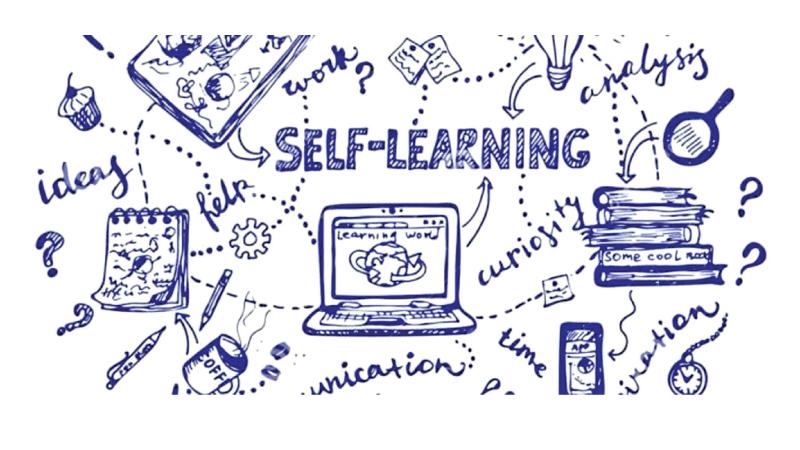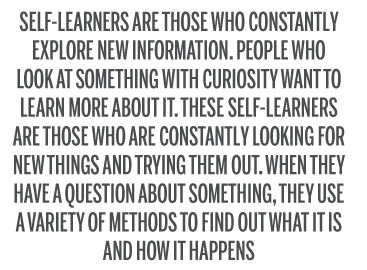
American entrepreneur Jim Rohn said, “Formal education will make you a living; self-education will make you a fortune.” This leads to a new way of self-learning. Formal education gives us a job to survive. But things that we learn by ourselves through self-learning can bring us more.
Why is this self-learning essential for us? The world of self-learning can be a little hard. But, if we want to achieve our ambitions and stay relevant in an ever-changing world, self-learning is important.
The education of schoolchildren suffered a collapse due to the political and economic crises faced by the country in the recent past, but teachers constantly kept children engaged in learning through online technology. Self-learning is a valuable concept that should be encouraged as the main way to acquire new knowledge and skills. Self-learning is not only for children but also for anyone of any age because learning happens from birth to death.
 We can simply define self-learning as the process of gathering information without the assistance of another person. We learn by ourselves without anyone’s influence or help. Various abilities are built through self-learning: being motivated to try new problems on our own, having the ability to withstand challenges, learning the concept better on the first try, being motivated to learn through effort, developing self-confidence and self-esteem, and not being afraid of making mistakes in learning.
We can simply define self-learning as the process of gathering information without the assistance of another person. We learn by ourselves without anyone’s influence or help. Various abilities are built through self-learning: being motivated to try new problems on our own, having the ability to withstand challenges, learning the concept better on the first try, being motivated to learn through effort, developing self-confidence and self-esteem, and not being afraid of making mistakes in learning.
Easier and faster
Self-learning is made easier with the advancement of new media and new technology. The rise of the Internet has proven that self-learning is easier and faster. Nowadays, we can learn how to do anything through a simple Google search, watching a YouTube tutorial or reading instruction manuals.
There are many advantages to self-learning. Through that, we can develop strong problem-solving skills. It enables you to identify problems and find effective solutions quickly. This can be from colleagues, the Internet, or research. No matter what, challenges and obstacles don’t kill our drive to get our work done; instead, they give us new opportunities to learn something new at our own pace and time. We can learn how to proactively seek solutions instead of having solutions brought to us. The ability to learn quickly can easily adapt to changes in the environment.
Self-directed learning focuses more on the process than the outcome of learning. Besides, in self-learning, no one sits behind us and pressures us to know what we have to learn and how much time we have to complete it.
There is no pressure to learn the content within a timeframe, and get high marks. We choose what we want to learn, when we want to learn, and how we want to learn.
The overall result is an internalisation of content, which is why self-learners tend to internalise what they learn more than those who participate in directed learning. So, self-learning is a stress-free learning process.
While studying, we can also learn other important skills such as time management, self-assessment, and setting our goals.
These are important skills that we can apply anywhere in any condition. Self-learners have a strong commitment to tasks, learning how to stick to a plan until they achieve their goals.
New information
Self-learners are those who constantly explore new information. People who look at something with curiosity want to learn more about it. These self-learners are those who are constantly looking for new things and trying them out. When they have a question about something, they use a variety of methods to find out what it is and how it happens.
Self-learners can engage in these activities using social media and the Internet. They are curious and always strive to learn something new. A main part of learning is satisfying some level of curiosity, and learning happens naturally when there is curiosity. This means that we are motivated to learn and that we can gain a great deal of knowledge when directed from within rather than from external sources. It’s an adventure, and every time we learn something new.
Self-driven learning comes from a personal desire to acquire new knowledge. It is driven by the need to find more information about a topic and use that information for some purpose. We have a clear purpose as to why we are learning, and the information gained is often relevant and makes sense. We tend to look for in-depth information on a topic because we don’t just learn for the sake of learning. Learning has a purpose. It’s enjoyable and it leads to good results.
We can use YouTube tutorials, webinars, books, or any other form of learning to self-learn. With all these learning methods within our reach, we can choose the one that suits us best and the one that we find most attractive. And here we don’t need to stick to one mode of learning since we can try many methods of our choice.
One of the main problems we face is how we engage in self-learning. Of course, whether we learn from a school, university, course, or private educational institution, we must engage in the process of self-learning even during the learning procedure. because we cannot find all the things we need in one place. It is essential that we turn to self-education to gain further understanding and knowledge about certain issues that arise in our educational activities and on a daily basis.
Right frame of mind
Self-learning is also great to gain understanding regarding various matters that we encounter in our daily life. Any kind of learning requires one to be ready to take on the subject because there will be challenges and obstacles along the way. We have to be in the right frame of mind, understand what we want to learn and why this subject is important to us. We need a lot of internal motivation and studying preparation will keep us going even when our motivation levels are low.
Just as a teacher sets up a teaching plan that aims to help learners acquire various skills and knowledge at the end of a lesson, our personal learning should have an end goal. When learning goals are clear, we will evaluate our progress and whether we have acquired any knowledge, and this paves the way for an effective learning process. It leads us to a systematic learning process.
Based on the subject matter, we have a scope to choose a preferred learning program according to our needs.
We need to choose the one that best suits our learning style and the most effective one. We must be careful not to limit ourselves to one learning style. Having different tools gives us the opportunity to learn the same subject from different angles, which makes it easier to grasp the main subject matter.
In self-learning, there are no exams or evaluations to measure what we have achieved at the end of the learning process, like in the formal education system. Therefore, what should be done is to understand one’s needs and goals and try various activities by oneself to check the knowledge and understanding one has gained at the end of self-learning.
Education is something that we can never finish. Self-learning is a great concept that teaches us that we don’t have any assistant to lead us in learning.
If children practise this method from a young age, many problems arising in the child’s mind will be solved. Self-learning enables us to learn what we want, when we want, and how we want. We direct the learning process, and this is more effective than instructional learning.
